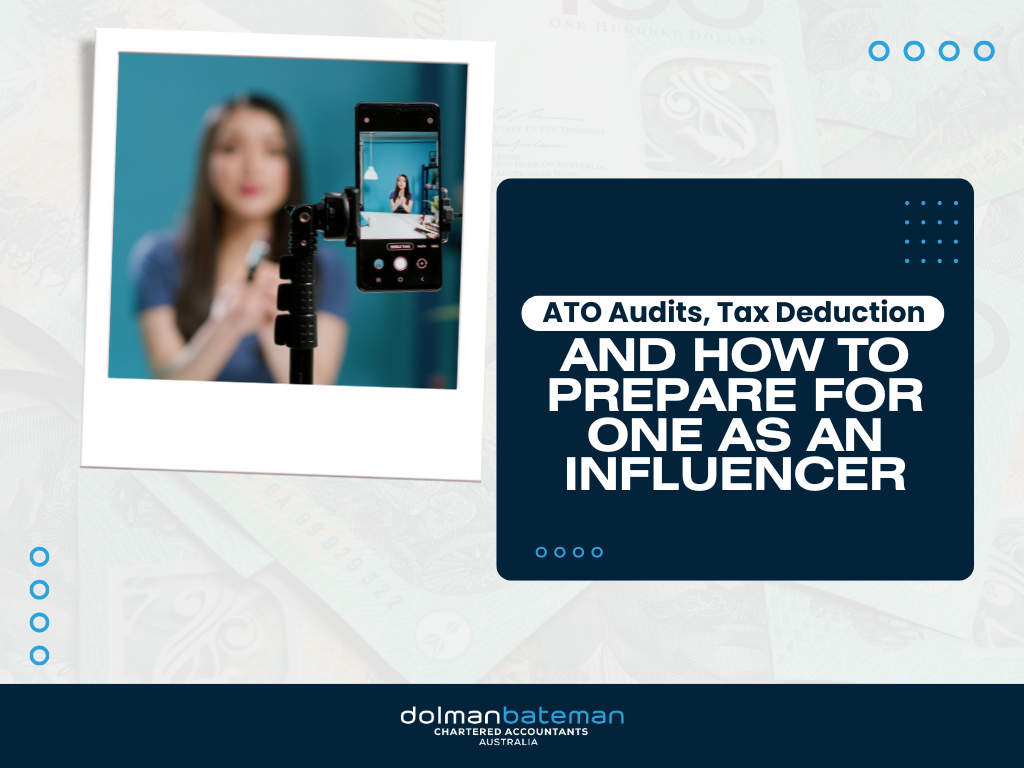ATO Audits, Tax Deduction, and How to Prepare for One as an Influencer
- Arnold Shields

- Jul 22, 2024
- 3 min read
Updated: Jan 21

Facing an ATO Audit as an Influencer? Here’s What You Need to Know
As a social media influencer, your income streams can be diverse, brand deals, affiliate marketing, YouTube ads, TikTok Creator Fund, OnlyFans tips, and that complexity makes you more visible to the Australian Taxation Office (ATO).
An ATO audit may sound intimidating, but being informed and prepared puts you in a strong position. In this guide, we explain what triggers an audit, what steps to take if selected, and how to maintain compliant records.
What Triggers an ATO Audit for Influencers?
The ATO uses advanced data-matching and behavioural analytics to identify red flags. Here’s what might trigger an audit:
Unreported Income: The ATO compares your reported income with data from banks, platforms like YouTube, Patreon, Stripe, and even social media activity. Omissions can be a red flag.
High or Unusual Deductions: Deductions that are inconsistent with your income level or industry benchmarks may prompt scrutiny.
Lifestyle Mismatches: If your public profile shows luxury holidays, designer fashion, or a high-end lifestyle that doesn’t align with your declared income, it may raise suspicions.
Ongoing Losses: Repeatedly reporting losses while continuing business activity can trigger investigation into whether the deductions are legitimate.
Industry Targeting: The influencer industry is a current focus for the ATO, due to the rise of undeclared benefits and blurred lines between personal and business expenses.
What To Do If You’re Selected for an Audit
If you receive an audit notice, act quickly and methodically:
✅ Stay Calm and Engage a Tax Professional
Contact a tax agent or accountant immediately. They’ll liaise with the ATO on your behalf and ensure your responses are strategic and accurate.
✅ Understand the Audit Scope
Know whether the audit is full (entire tax return) or specific (e.g. income from sponsorships). This helps you focus your response.
✅ Gather Your Documentation
You’ll need to supply:
Income records (e.g. invoices, contracts, platform payouts)
Expense receipts and logbooks
Bank and credit card statements
Communication with brands
✅ Respond Promptly
Meet the ATO’s deadlines. If you need more time, your advisor can request an extension.
✅ Review Past Returns
If errors are identified, you may be able to amend your returns voluntarily—often viewed more favourably than if the ATO finds them first.
How to Maintain Compliant Records
Your best defence against an audit is excellent record-keeping. Here’s how to do it right:
📌 Track Every Income Stream
Include:
Brand collaborations
Platform revenue (YouTube, Twitch, TikTok)
Affiliate marketing
Merchandise or eBook sales
Donations and subscriptions
📌 Keep All Expense Receipts
For items like:
Equipment (e.g. cameras, lighting)
Travel and accommodation for shoots
Software subscriptions
Outsourcing (e.g. editors, virtual assistants)
Business use of home (e.g. percentage of internet)
📌 Use Accounting Software
Tools like Xero, QuickBooks, or Rounded make income/expense categorisation and BAS/tax return prep much easier.
📌 Record Mileage and Business Travel
Use a logbook or mileage tracking app to justify vehicle and travel deductions.
📌 Archive Brand Communications
Keep emails or DMs confirming sponsorship value or product exchange terms. This supports both income declarations and deduction claims.
📌 Stay Organised for Five Years
ATO guidelines require you to retain tax records for five years after the relevant return is lodged.
Final Thoughts: Audit-Proof Your Influencer Business
ATO audits are serious but manageable with the right preparation. By maintaining clear, up-to-date financial records and working closely with a tax expert, you can reduce your audit risk and ensure your influencer business is compliant.
Need help with your tax or audit preparation? Call Dolman Bateman on (02) 9411 5422 today. We work with influencers every day to protect their businesses and maximise deductions.
Disclaimer:
The information provided in this article is general in nature and does not constitute personal financial, legal or tax advice. While every effort has been made to ensure the accuracy of this content at the time of publication, tax laws and regulations may change, and individual circumstances vary. Dolman Bateman accepts no responsibility or liability for any loss or damage incurred as a result of acting on or relying upon any of the information contained herein. You should seek professional advice tailored to your specific situation before making any financial or tax decisions.



